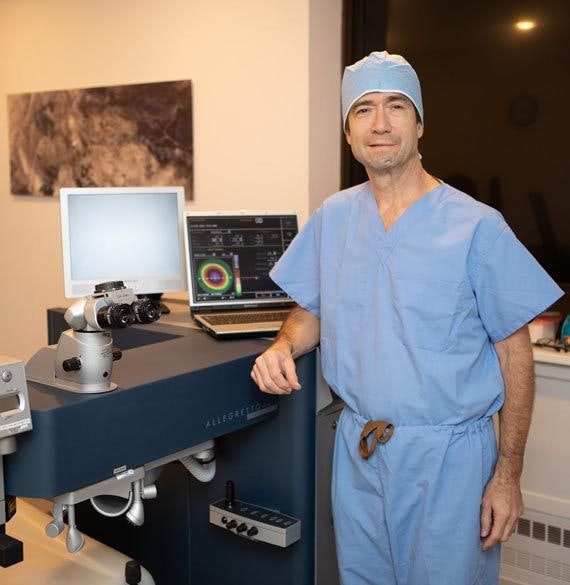Glaucoma
By the time you notice the signs of glaucoma, it could already be too late.
Glaucoma can take your vision before presenting any noticeable symptoms. Routine eye exams are the only way to catch the disease early on.
The eye doctors at Eye Physicians and Surgeons, P.A. in Dover, Newark, and Wilmington, DE, can diagnose glaucoma and prevent vision loss.
Glaucoma Explained
Glaucoma is a group of incurable degenerative eye diseases in which the eye's intraocular pressure (IOP) increases so much that it causes optic nerve damage. Located at the back of the eye, the optic nerve transmits signals from the retina to the brain, which allows us to see. Permanent vision loss occurs when the optic nerve is damaged. Our eye doctors can detect the early signs of the disease and prevent it from taking your vision.
The Types of Glaucoma
There are several types of glaucoma, each with different causes and symptoms. While all our Delaware-based eye doctors treat common glaucoma, Dr. Scott Fudemberg specializes in complex, difficult-to-treat glaucoma. He is one of only a few referral specialists treating glaucoma in the Wilmington area.

Open-Angle Glaucoma
Open-angle glaucoma, the most common form of the condition, is caused by a blockage in the eye's trabecular meshwork. The blockage reduces the natural drainage of fluid, causing a buildup of eye pressure. Open-angle glaucoma presents no symptoms in the early stages. If left untreated, the disease can cause you to lose your peripheral vision, central vision, or lead to complete blindness. Early treatment is necessary to preserve sight.

Angle-Closure Glaucoma
Angle-closure glaucoma, or closed-angle glaucoma, causes an acute, sudden blockage where fluid cannot drain, leading to a rapid increase in eye pressure. The symptoms of angle-closure glaucoma come on suddenly and can cause a severe headache, eye pain, nausea, and blurred vision. Contact our practice immediately if you are experiencing any symptoms of angle-closure glaucoma.

Normal-Tension Glaucoma
Normal-tension glaucoma is not connected with an increase in intraocular pressure, making it unique to other forms of the disease. The exact cause of this type of glaucoma is still unknown. No matter the cause, early detection is still the best way to treat the condition and prevent vision loss. Similar to open-angle glaucoma, normal-tension glaucoma presents no symptoms in the early stages. As it progresses, patients tend to experience blurred vision and an eventual loss of peripheral vision.

Secondary Glaucoma
Secondary glaucoma is caused by an underlying medical condition, like a previous eye injury or disease, that leads to increased eye pressure and optic nerve damage. Secondary glaucoma can be either open or closed-angle, and can still lead to vision loss if left untreated.

Congenital Glaucoma
Congenital glaucoma occurs at birth and is caused by genetic defects in the drainage structure of the eye or another eye condition. Symptoms can be challenging to detect since it occurs in children and infants. Some symptoms include cloudy corneas, spasms of the eyelid, and increased blinking.
The Risk Factors of Glaucoma
Medical Conditions
A history of certain medical conditions like diabetes, hypothyroidism, leukemia, and ocular hypertension can all increase your risk for glaucoma.
Family History
Your risk of developing glaucoma increases if the disease runs in your family.
Eye Injury
Patients who have had a previous injury to their eye have a greater chance of developing glaucoma.
Age
Your risk increases as you age, and significantly increases after age 60.
Race
African Americans have a higher risk for glaucoma.
Medication
Previous steroid use can increase your risk of developing glaucoma.
When Should You Seek Treatment?
/
Our practice recommends maintaining yearly eye exams to help prevent glaucoma from progressing. You should contact our Wilmington, DE, practice immediately if you notice any change in your visual field, as this could be a sign of glaucoma.
Don't Let Glaucoma Steal Your Sight Contact Our Wilmington-Area Practice Today
When facing vision loss, you want an experienced team you can trust. Our eye doctors have the skills, tools, and experience to diagnose and treat any stage of glaucoma and help protect your vision. As a patient-focused practice, we listen to each individual's needs and are dedicated to providing the finest eye care.
Visiting Eye Physicians and Surgeons, P.A. once a year can help prevent optic nerve damage and save your vision. Our comprehensive exams go beyond just assessing your visual field. We can test for all forms of glaucoma to get ahead of the disease and protect your sight.
We have convenient optometry offices in Wilmington, Dover, and Newark; our Wilmington office is home to our state-of-the-art surgical center. Contact our practice today to request your consultation.
(302) 652-3353

We Treat You Like Family Our Caring Staff Creates 5-Star Experiences
"Dr. Scott Fudemburg is amazing. He delivers compassionate care, naturally. He is caring and meticulous. He is highly skilled. He is thorough. Quickly, it becomes obvious that he takes his practice seriously and expects good results and is laser focused on achieving that. He takes his time to explain where the issues are, what he intends to do to correct them and the role that he's expecting you to play to achieve the best results. It doesn't seem like failure is an option in his sphere." Dexter Walker, 2024
Non-Invasive Treatment: Medical Eye Drops are Your First Line of Defense
The treatment of glaucoma depends on the type and stage of the disease. Our eye doctors typically recommend eye drops for patients in the early stages of glaucoma. Some eye drops can decrease eye pressure by improving fluid drainage, while others reduce the amount of fluid your eyes produce. Both forms help protect you from optic nerve damage and vision loss.

Glaucoma Laser Surgery
Our Delaware-based practice uses the latest technology to provide the most effective treatment options.
Are You Due for an Eye Exam? Contact Our Wilmington Practice
It is important to maintain routine eye exams to protect your ocular health and prevent vision loss. Regular exams can help us detect signs of glaucoma. Early diagnosis is the best way to protect your vision. Fill out our online form or call our Wilmington, DE, practice to request your visit today.
Serving Delaware With Expert Eye Care
"Courteous and efficient staff and Doctors.
Most thorough eye examination I've ever had.
Excellent communications between staff/Doctors and the patient!" Meg Gallagher, 2024
Frequently Asked Questions About Glaucoma
Q. If I have vision loss already from glaucoma, can it be restored?
A. While research and glaucoma treatments are progressing, if you have suffered vision loss due to optic nerve damage, it cannot be undone. This is why it is critical to seek treatment as soon as you notice any changes in your vision.
Q. Is glaucoma treatment painful?
A. Most patients tolerate glaucoma treatment with minimal pain. However, recovery will vary based on the specific type of treatment and if you adhere to post-op guidelines. If you experience extreme pain after glaucoma treatment, it is imperative that you contact our Wilmington practice immediately.
Have more questions about glaucoma?
Delaware Trusts Us to Protect Their Vision
"The physicians are all awesome. They explain things thoroughly. The staff is very friendly. The facility very clean. I'd recommend this place to any friend or family member." Lesia Otuya, 2024




